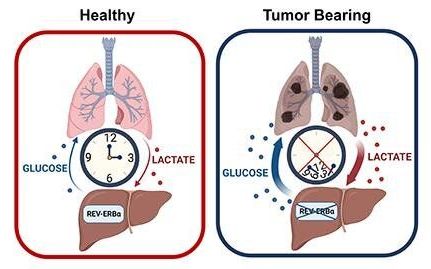This research places the circadian clock as a central regulator of glucose production during lung cancer progression and provides important insight toward the development of novel therapeutics to target REV-ERBα to suppress cancer cell growth.
New research from the University of California, Irvine reveals how the circadian regulation of glucose production in the liver is lost during lung cancer progression, and how the resulting increase in glucose production may fuel cancer cell growth.
The new study titled, “Glucagon regulates the stability of REV-ERBα to modulate hepatic glucose production in a model of lung cancer-associated cachexia,” published today in Science Advances, illustrates how the circadian clock is regulated under conditions of stress such as during lung cancer progression and cancer-associated tissue wasting disease called cachexia.
“Our research shows that a critical circadian protein, REV-ERBα, controls glucose production in the liver. During lung cancer progression and specifically under conditions of cachexia, this circadian regulation is lost, resulting in increased glucose production from the liver,” said senior author Selma Masri, Ph.D., assistant professor in the Department of Biological Chemistry at UCI School of Medicine. “Based on our findings, we identified that lung tumors are able to provide instructive cues to the liver to increase glucose production, a major fuel source for cancer cells.”
